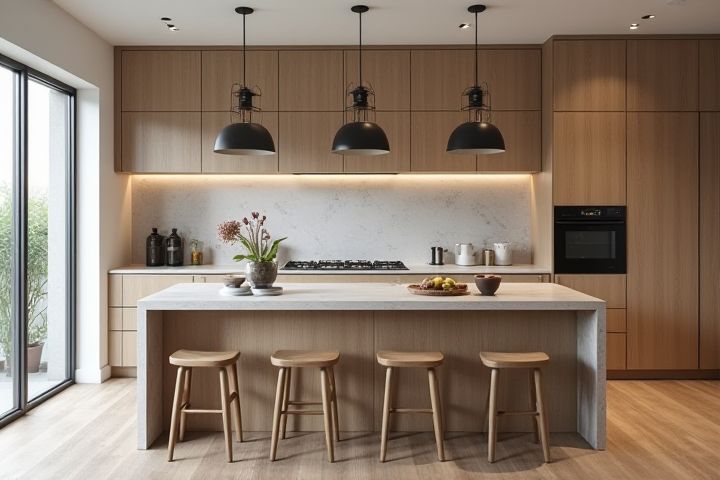
Yes, a house can have two kitchens, often referred to as a main kitchen and a secondary kitchen or butler's kitchen. The main kitchen typically serves as the primary space for cooking and meal preparation, featuring essential appliances like a refrigerator, oven, and dishwasher. The secondary kitchen may be designed for additional cooking needs, catering, or as a space for entertaining, often equipped with supplementary appliances and storage. This design choice enhances functionality, especially in larger homes or those with a focus on hospitality. Homeowners appreciate the convenience of multiple kitchens, especially during gatherings or large family events.
Can A House Have Two Kitchens
Building Codes
Building codes allow for the possibility of a house having two kitchens, but specific regulations vary based on local jurisdictions. Homeowners must ensure that both kitchens meet requirements for plumbing, electrical systems, ventilation, and safety standards set forth by the code. Moreover, if the second kitchen is intended for rental or multi-family use, zoning laws and permits may apply. Always consult your local building authority to understand the precise guidelines and obtain any necessary permits for such renovations.
Zoning Laws
Zoning laws can vary significantly by location, impacting the feasibility of having two kitchens in a single-family home. In many residential zones, regulations typically restrict the number of kitchens to one to maintain the property's intent for single-family use and limit potential rental situations. However, some jurisdictions may allow a second kitchen if it meets specific criteria, such as an accessory dwelling unit (ADU) designation, which could provide additional living space. It's essential to consult your local zoning ordinances and possibly obtain a building permit to ensure compliance with these regulations before making any modifications.
Utility Requirements
A house can indeed have two kitchens, often referred to as a primary and a secondary kitchen. Many municipalities have specific utility requirements for each kitchen, including adequate plumbing, drainage, and electrical systems. For instance, if both kitchens include a stove and dishwasher, ensure that your home's electrical capacity meets the demand of twice the energy consumption. Local building codes may require permits for such installations, so it's crucial to consult with local authorities to ensure compliance and safety.
Resale Value Impact
Having two kitchens in a house can significantly influence its resale value, particularly in areas where multi-generational living is common. Potential buyers often see this feature as a convenience, allowing for independent cooking spaces or catering, which can enhance the home's appeal. However, in markets where traditional layouts dominate, a secondary kitchen may be perceived as a negative, potentially limiting your buyer pool. Ultimately, determining how a second kitchen affects your home's value depends on local trends and buyer preferences in your specific neighborhood.
Potential for Multi-Generational Living
A house can indeed feature two kitchens, making it an ideal setup for multi-generational living arrangements, where families can enjoy both shared and private spaces. The presence of two kitchens allows distinct cooking and dining experiences, catering to different dietary needs or cultural practices. This design promotes greater independence among family members, enabling parents and grandparents to maintain their own culinary routines while fostering togetherness in communal areas. Such configurations can enhance property value and appeal, attracting homebuyers seeking versatile living solutions.
Rental Opportunities
Having two kitchens in a house can significantly enhance rental opportunities, particularly in multi-family setups or properties intended for short-term leases. This feature attracts a wider range of tenants, including larger families or groups who appreciate the convenience of additional cooking space. Properties with dual kitchens can command higher rental rates, sometimes yielding an increase of 15-20% compared to similar homes with a single kitchen. Investing in a layout that accommodates two kitchens not only adds value but also caters to the growing demand for flexible living arrangements.
Increased Property Taxes
Owning a house with two kitchens can significantly impact your property taxes, as the additional kitchen may increase the home's assessed value. Property assessors often consider features like multiple kitchens to determine the marketability and functionality of a home, potentially leading to higher tax rates. You should also be aware that some municipalities have specific regulations regarding auxiliary kitchens that might require permits or additional zoning considerations. Evaluating these factors is essential when considering the potential financial implications of installing a second kitchen in your residence.
Insurance Considerations
Having two kitchens in a house can impact your homeowners insurance, as it may affect property valuation and liability coverage. Insurers often classify properties with multiple kitchens as multi-family homes, which can lead to higher premiums due to increased risk factors. You should also consider whether one kitchen is used for rental purposes, as this could require additional endorsements or a separate landlord policy to cover potential liabilities. Prior to making any renovations or alterations, consulting with your insurance agent ensures that your coverage adequately addresses these unique features.
Renovation Costs
A house can indeed have two kitchens, often found in configurations like in-law suites or homes designed for entertaining. Renovation costs for adding a second kitchen typically range from $20,000 to $50,000, largely depending on the size, appliances, and finishes chosen. Key expenses include plumbing installation, electrical upgrades, and cabinetry, which can significantly impact your budget. Before starting the project, it's crucial to evaluate local building codes and potential return on investment, as these factors can affect overall costs and future home value.
Space Utilization Options
Yes, a house can have two kitchens, which can be an excellent space utilization option. The main kitchen can serve as the primary cooking and entertaining area, while an additional kitchen can function as a prep space or accommodate specific culinary needs, such as a baking station or outdoor cooking area. This configuration is particularly beneficial for larger families or those who enjoy hosting gatherings, as it allows for simultaneous meal preparation and reduced congestion. You can also consider separate kitchens for different cuisines or dietary requirements, making meal planning and cooking more efficient.
